| Srl | Item |
| 1 |
ID:
119188
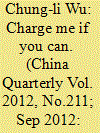

|
|
|
|
|
| Publication |
2012.
|
| Summary/Abstract |
While the judicial system is an important part of any given political regime, other than in a few Western countries, it has received comparatively little attention. This study employs vote-buying litigation as a litmus test to inquire whether or not the judiciary in Taiwan is politically biased in its judgments. Vote buying has long marred Taiwan's elections and the general public does not seem to trust the judicial system to be independent of political influences. This study examines the impact of political variables (including partisanship, whether candidates are elected or not, and the type of election) on court decisions in vote-buying litigation between 2000 and 2010. The article looks at these decisions at three levels: district courts, high courts, and the Supreme Court. The empirical findings indicate that the effects of political factors are considerably less an influence than expected on trial outcomes.
|
|
|
|
|
|
|
|
|
|
|
|
|
|
|
|
| 2 |
ID:
122517
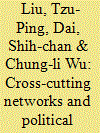

|
|
|
|
|
| Publication |
2013.
|
| Summary/Abstract |
This research examines whether public political participation in Taiwan is influenced by people's interactive relations and social environments. In contrast to the "sociodemographic factor" and "political mobilization" approaches used in previous studies of political participation, this paper's theoretical structure is that of "cross-cutting networks." It analyzes the influence exerted by social network "cross-pressures" on voters' engagement in political activities and their likelihood of voting in the 2010 mayoral elections in Taipei, Kaohsiung, and Taichung cities. The study uses national survey data to test the association between cross-cutting networks and political participation. The methodology adopted includes cross-tabulation analyses, ordered logit model, and logit model. The findings reveal that people in cross-cutting networks involving greater political disagreement are less likely to participate in politics while individuals engaging in homogeneous social interactions and under low-level cross-pressure are predisposed to participate more actively in politics.
|
|
|
|
|
|
|
|
|
|
|
|
|
|
|
|
| 3 |
ID:
179971
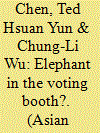

|
|
|
|
|
| Summary/Abstract |
In 2005, the single nontransferable vote system for legislative elections in Taiwan was replaced by a mixed-member majoritarian system, with an accompanying reduction in available district seats. In theory, by increasing the threshold of exclusion and placing the power of nomination in the hands of political parties, this reform should reduce vote-buying and local factionalism. We collected data on legislative nominees charged with vote-buying and on the local factional ties of candidates. Our results suggest that the reforms did reduce these problems. First, comparing the proportion of candidates charged with vote-buying before and after the reform shows a decrease in the second and third post-reform elections. Second, factional status predicts a candidate’s likelihood of running in consecutive elections before the reform but not after. Differences between factional and nonfactional candidates ceased to be significant after the reform, revealing the decreasing relevance of factions.
|
|
|
|
|
|
|
|
|
|
|
|
|
|
|
|
| 4 |
ID:
100973
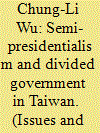

|
|
|
| 5 |
ID:
086456
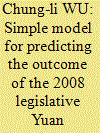

|
|
|
|
|
| Publication |
2008.
|
| Summary/Abstract |
The 2008 Legislative Yuan elections in Taiwan were held under a new electoral system, a combination of single-member districts with a plurality system, the national nonpreferential list proportional representation system, and the single nontransferable vote system for the aboriginal districts. This work develops a forecasting model and hypothesizes that the partisan voting behavior of Taiwan's citizens largely remains identifiable and durable. There are two methodologies used in this study. The first is the use of three-wave aggregate-level electoral data to estimate the outcomes of the 2008 legislative elections. The second employs ordinary least squares (OLS) estimations to evaluate the effects of previous three-wave electoral results on the 2008 elections. Using the first method, the forecast success rate is more than 80 percent. The findings also reveal that the OLS model performs satisfactorily because two of the three coefficients reach statistical significance. This study concludes by listing three implications of the election: that it was a critical watershed in Taiwan's politics, that there is a geopolitical gap between the north and south, and that minor political parties were eliminated from Taiwan politics.
|
|
|
|
|
|
|
|
|
|
|
|
|
|
|
|